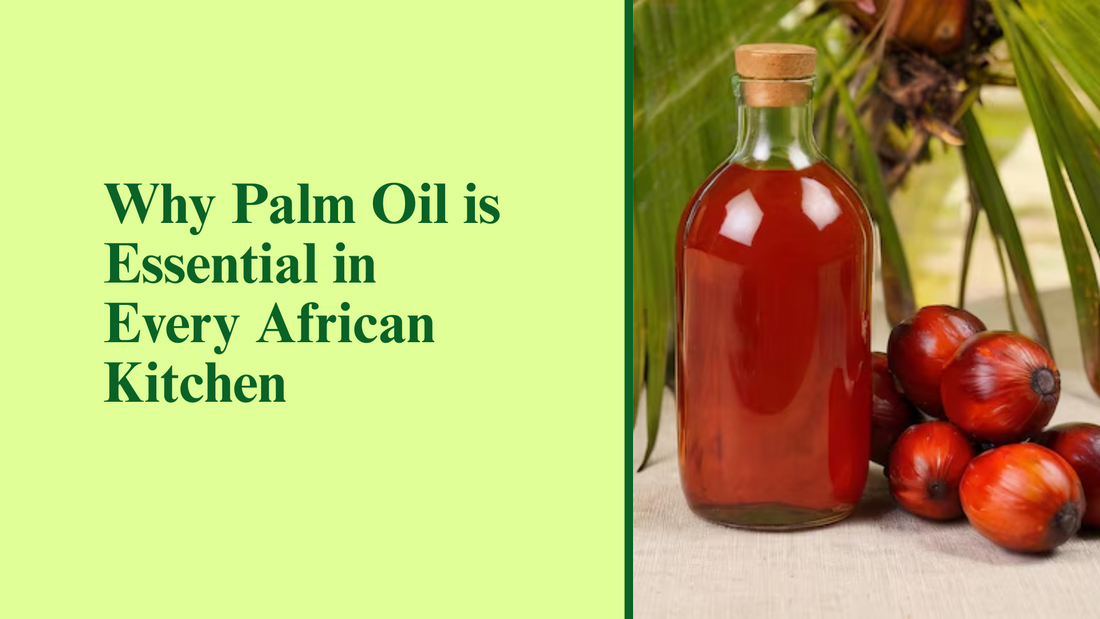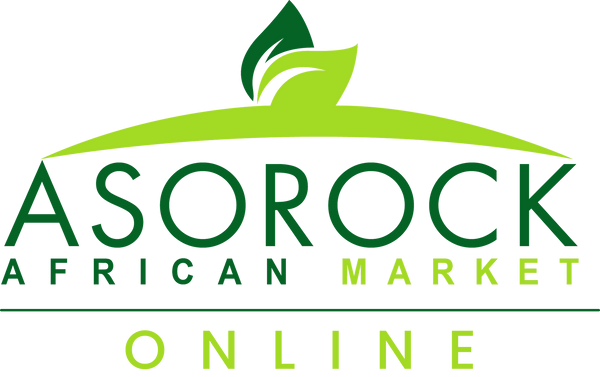
Why Palm Oil is Essential in Every African Kitchen
Share
Step into an African kitchen and you will always find a bottle of red palm oil sitting pretty and proudly on the counter.
The moment it hits a hot pot, it just fills the air with its rich aroma that is very distinct and can't be mistaken. Palm oil’s red color does more than just change the food color; it transforms an ordinary dish into one worth talking about.
From Nigeria to Ghana to Morocco, and even across oceans to countries like Pakistan and Bangladesh, palm oil is not just oil—it is identity poured into every meal.
For African Americans, nothing reminds us of home more than cooking with palm oil. From egusi soup to beans porridge to ofe akwu (banga soup), unlike canola, soybean, or peanut oil, which may do the job for frying, they simply cannot give food the same taste, flavor, and identity that palm oil does.
For many families abroad, finding good palm oil in an African store near them feels like finding a taste of home, thats why we at Aso Rock Market deliver aunthentic nigerian palm oil to your doorstep anywhere in the United States, because, Palm oil is not just another african ingredient; it connects africans living abroad to their origin.
If you want to discover other ingredients that complete the African pantry, read our blog on 10 Essential African Ingredients Every Kitchen in the Diaspora Needs.
Photo by BritamFarms
Health, Questions, and Price
Palm oil has also been trusted for generations when feeding babies. Mothers often mix a little oil into children’s food because of its natural vitamins, especially vitamin A, which supports good eyesight.
It is also rich in vitamin E and antioxidants, which help the body fight against illnesses and boost immunity. This makes it not just tasty but also a healthy source of nourishment for families.
Unlike processed or hydrogenated oils, natural non-hydrogenated palm oil is gentle and nourishing. This answers the common question, “Is palm oil bad for you?” Yes, palm oil is good for your body when taken in moderation.
Just like olive oil, palm oil is a natural fat the body needs for energy. The problem is not the oil itself but how it is processed. Fresh, unrefined palm oil from Africa or Malaysia is full of nutrients, while the highly processed versions have fewer nutrients compared to the unrefined.
Another concern for many families in the United States is the price of palm oil. Because it is imported, prices often change depending on shipping costs and global demand.
At Aso Rock Market, we do our best to make sure the prices are fair and affordable for our customers. Palm oil has become one of those core items—like rice or yam—that every African pantry needs, which is why we work hard to keep it within reach.
Palm Oil’s Uniqueness and Global Reach
At the store, some customers ask us if they can replace palm oil with other options like soybeans peanut, or canola oil. But our answer remains the same: while those oils have their own use, they serve different purposes.
Palm oil is different. It is unique. Its taste and natural color cannot be matched. Its versatility in cooking makes it even more special—it can be used for frying, stewing, or adding depth to soups and sauces.
Aside from palm oil, we can also get palm kernel oil and olein from palm fruits, which can be used not just for cooking but for soap making and body creams as well, a testament to palm fruits' versatility.
If you want to see palm oil in action, check out our 5 Must-Have Nigerian Soups You Need to Try where palm oil is the main character in delicious dishes like egusi and banga soup. For every African in the diaspora, we’ve shared more about our journey of food and identity in our blog, From Lagos to Atlanta: The Journey of African Food in the Diaspora.
Palm oil is more than just another African ingredient—it is heritage, tradition, health, and connection. It is part of a global story that unites different cultures, showing how food connects people beyond borders.
It is not just food—it is a piece of Africa, carried in every spoonful. And Nigeria is one of the biggest users of palm oil across africa.
From feeding babies with healthy vitamins to making rich Nigerian soups to keeping families abroad tied to home, palm oil has earned its place in the kitchen.
So you don’t need to google search for ‘African store near me’ anymore; visit Aso Rock Market online to buy original palm oil and other african groceries and essentials.
